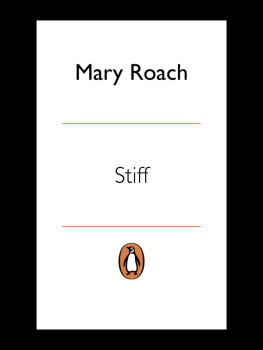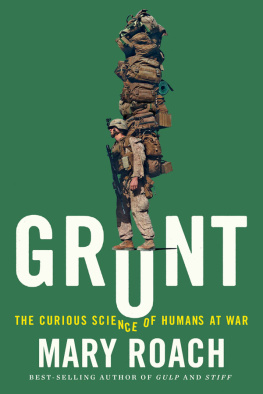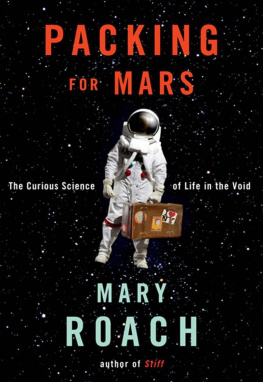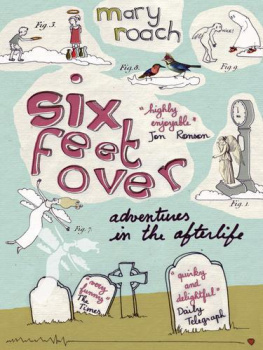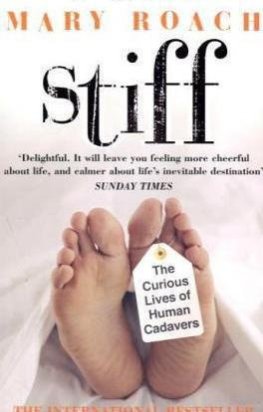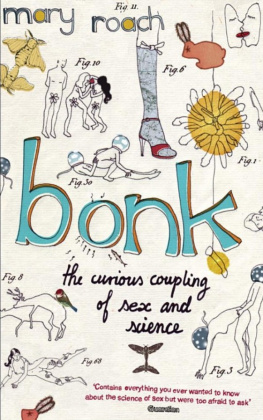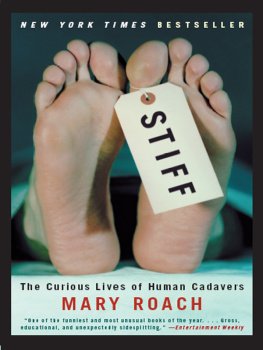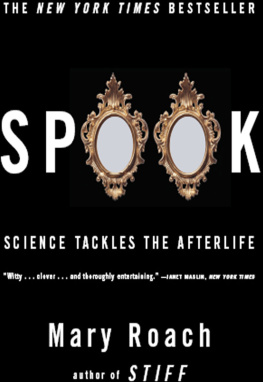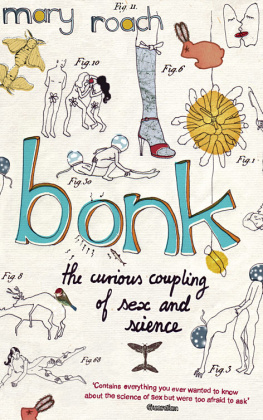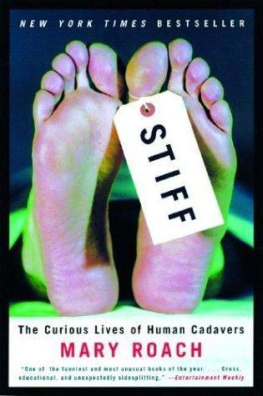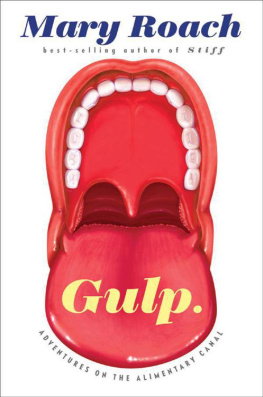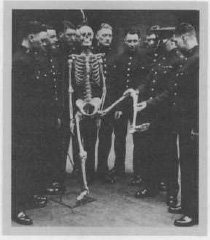PENGUIN BOOKS
Published by the Penguin Group
Penguin Books Ltd, 80 Strand, London WC2R 0RL , England
Penguin Group (USA) Inc., 375 Hudson Street, New York, New York 10014, USA
Penguin Books Australia Ltd, 250 Camberwell Road, Camberwell, Victoria 3124, Australia
Penguin Books Canada Ltd, 10 Alcorn Avenue, Toronto, Ontario, Canada M4V 3B2
Penguin Books India (P) Ltd, 11 Community Centre, Panchsheel Park, New Delhi 110 017, India
Penguin Group (NZ), cnr Airborne and Rosedale Roads, Albany, Auckland 1310, New Zealand
Penguin Books (South Africa) (Pty) Ltd, Block D, Rosebank Office Park, 181 Jan Smuts Avenue, Parktown North, Gauteng 2193, South Africa
Penguin Books Ltd, Registered Offices: 80 Strand, London WC2R 0RL , England
www.penguin.com
Published in the United States of America by W.W. Norton & Company Ltd. 2003
Published in Great Britain by Viking 2003
Published in Penguin Books 2004
Copyright Mary Roach, 2003
All rights reserved
The moral right of the author has been asserted
In several instances, names have been changed to respect privacy
Photo credits: title page: Hulton Deutsch Collection/Corbis; p. 17: Getty Images/Juliette Lasserre; p.35: Getty Images/Robin Lynn Gibson; p.59: Photofest; p.85: Photofest; p. 111: Getty Images/Stephen Swintek; p. 129: Hulton Deutsch Collection/Corbis; p. 155: Geoffrey Clements/Corbis; p. 165: Getty Images/Tracy Montana/Photolink; p.197: Bettmann/Corbis; p.219: Getty Images/John A. Rizzo; p. 249: Minnesota Historical Society/Corbis; p.279:T.R. Tharp/Corbis
ISBN: 978-0-241-96501-6
He just wanted a decent book to read
Not too much to ask, is it? It was in 1935 when Allen Lane, Managing Director of Bodley Head Publishers, stood on a platform at Exeter railway station looking for something good to read on his journey back to London. His choice was limited to popular magazines and poor-quality paperbacks the same choice faced every day by the vast majority of readers, few of whom could afford hardbacks. Lanes disappointment and subsequent anger at the range of books generally available led him to found a company and change the world.
We believed in the existence in this country of a vast reading public for intelligent books at a low price, and staked everything on it
Sir Allen Lane, 19021970, founder of Penguin Books
The quality paperback had arrived and not just in bookshops. Lane was adamant that his Penguins should appear in chain stores and tobacconists, and should cost no more than a packet of cigarettes.
Reading habits (and cigarette prices) have changed since 1935, but Penguin still believes in publishing the best books for everybody to enjoy.We still believe that good design costs no more than bad design, and we still believe that quality books published passionately and responsibly make the world a better place.
So wherever you see the little bird whether its on a piece of prize-winning literary fiction or a celebrity autobiography, political tour de force or historical masterpiece, a serial-killer thriller, reference book, world classic or a piece of pure escapism you can bet that it represents the very best that the genre has to offer.
Whatever you like to read trust Penguin.
www.penguin.co.uk
Join the conversation:
Twitter Facebook
PENGUIN BOOKS
STIFF
Mary Roach is a journalist. She has written for Salon, Wired, GQ, Discover, Vogue and the New York Times Magazine. This is her first book.
For wonderful Ed
Introduction
The way I see it, being dead is not terribly far off from being on a cruise ship. Most of your time is spent lying on your back. The brain has shut down. The flesh begins to soften. Nothing much new happens, and nothing is expected of you.
If I were to take a cruise, I would prefer that it be one of those research cruises, where the passengers, while still spending much of the day lying on their backs with blank minds, also get to help out with a scientists research project. These cruises take their passengers to unknown, unimagined places. They give them the chance to do things they would not otherwise get to do.
I guess I feel the same way about being a corpse. Why lie around on your back when you can do something interesting and new, something useful? For every surgical procedure developed, from heart transplants to gender reassignment surgery, cadavers have been there alongside the surgeons, making history in their own quiet, sundered way. For two thousand years, cadaverssome willingly, some unwittinglyhave been involved in sciences boldest strides and weirdest undertakings. Cadavers were around to help test Frances first guillotine, the humane alternative to hanging. They were there at the labs of Lenins embalmers, helping test the latest techniques. Theyve been there (on paper) at Congressional hearings, helping make the case for mandatory seat belts. Theyve ridden the Space Shuttle (okay, pieces of them), helped a graduate student in Tennessee debunk spontaneous human combustion, been crucified in a Parisian laboratory to test the authenticity of the Shroud of Turin.
In exchange for their experiences, these cadavers agree to a sizable amount of gore. They are dismembered, cut open, rearranged. But heres the thing: They dont endure anything. Cadavers are our superheroes: They brave fire without flinching, withstand falls from tall buildings and head-on car crashes into walls. You can fire a gun at them or run a speedboat over their legs, and it will not faze them. Their heads can be removed with no deleterious effect. They can be in six places at once. I take the Superman point of view: What a shame to waste these powers, to not use them for the betterment of humankind.
This is a book about notable achievements made while dead. There are people long forgotten for their contributions while alive, but immortalized in the pages of books and journals. On my wall is a calendar from the Mtter Museum at the College of Physicians of Philadelphia. The photograph for October is of a piece of human skin, marked up with arrows and tears; it was used by surgeons to figure out whether an incision would be less likely to tear if it ran lengthwise or crosswise. To me, ending up an exhibit in the Mtter Museum or a skeleton in a medical school classroom is like donating money for a park bench after youre gone: a nice thing to do, a little hit of immortality. This is a book about the sometimes odd, often shocking, always compelling things cadavers have done.
Not that theres anything wrong with just lying around on your back. In its way, rotting is interesting too, as we will see. Its just that there are other ways to spend your time as a cadaver. Get involved with science. Be an art exhibit. Become part of a tree. Some options for you to think about.

